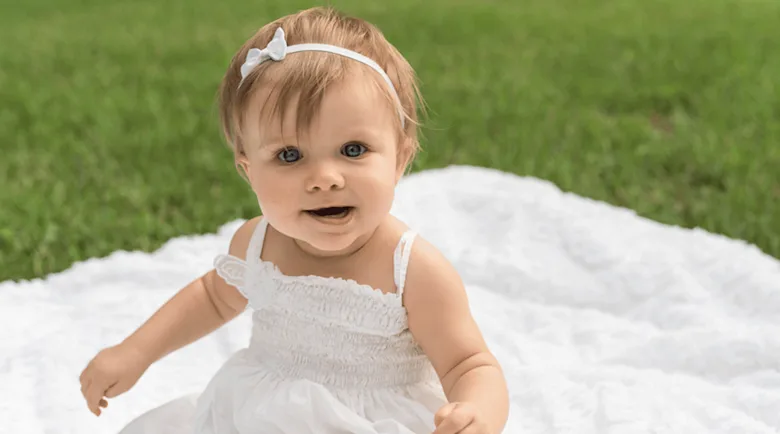46-Week-Old Baby

Week 46 is a perfect time to work on communication with baby and encourage their self-expression. Offer them choices in play and food, and watch their independence blossom. Here’s more of what you can expect at 46 weeks.
Growth
The average weight for babies around this time is 19.1 pounds for girls and 20.5 pounds for boys. The average length is 28.4 inches for girls and 29.1 inches for boys. By now, you should start to see a growth curve that shows baby growing steadily.
Emerging skills
Baby’s motor skills are advancing, with baby becoming more upright by the minute, “cruising” on furniture and other objects in preparation for their first independent steps. (Make sure everything they’re holding on to is sturdy!) Baby’s pincer grasp—the ability to pick up small objects with their thumb and forefinger—is becoming more precise, so your kiddo is getting better at feeding themselves, possibly using a spoon. At this age, communication is evolving quickly: Baby might be saying “mama” or “dada”, and using body language like waving bye-bye or shaking their head.
Feeding
Offer baby foods with different textures and flavors to help them explore and prevent pickiness later on. Baby might not like every food right away—and that’s okay! Don’t force it, but keep offering to give baby a chance to try foods again and again. You can give them a small cup with 1 to 2 ounces of water in it with their food, but it’s best to avoid juice and other sugary drinks for now. If baby’s more interested in playing peekaboo or dropping the spoon on the floor at mealtime, that’s normal at this age—the world is a fascinating place, after all. But try not to distract your little one while they’re eating, and watch for signs that they’re full; that tiny belly may fill up quicker than you’d expect.
Sleep
Baby needs about 12 to 16 hours of sleep per 24-hour period, including nine to 12 hours at night. Night wakeups are still common at this age, often due to separation anxiety, which is a normal stage of development in the second half of baby’s first year. If this happens, give them a little time to settle down and then quietly reassure your child that you’re there. Then, let them know that it’s time to go back to sleep.
Baby doesn’t listen when I tell them “no.” What should I do?
Baby should understand “no” by age one and pause briefly or stop when you say it—so it’s normal if at 46 weeks they’re not quite there yet. Be consistent and teach baby “wanted behaviors”—say, chewing on a teether instead of your wallet—by showing them what to do and using positive words, or hugs and kisses, when they do it. Baby will get the hang of it soon enough!
Do I need to watch my language around baby?
Research shows that babies start understanding concrete words at around 6 to 9 months and more “abstract” words closer to 14 months. Don’t stress if the occasional bad word comes out—no one is perfect—but if you want a swearing-free household, it’s a good idea to try to kick the habit.
Baby preferences
All of a sudden, baby has opinions! Around this time, you might notice that baby has preferences when it comes to toys, foods and even the adults around them. Research has found that babies’ choices—however random they might be at first—later influence their preferences. It’s important to offer choices to foster independence and teach baby about decision-making.
When do babies start talking?
This is a milestone that's long been in the making, stretching back to their early babbling days and even in the womb, when baby would listen to you talk. There's a range for when babies say their first words, but generally little ones start uttering words when they're around 12 months old and talk more clearly at 18 months old. What's that first word going to be? It's often something that's common in your child’s world, such as food items (banana, apple, milk), toys (ball, baby, car), important people (Mama, Dada, a pet or sibling name) or words from familiar routines (more, mine or all done). How to help baby learn to talk? Keep up those chats with your child! Narrate what you're doing, sing songs, read, make rhyming statements, enunciate your words and give baby time to respond.
- Take a social media break. It’s all too easy to get caught up in the “perfect” lives of other people on social media, which can negatively affect your mental health. If that sounds familiar, consider taking a break from social media or making a schedule for social scrolling to limit your usage. Turn off notifications so you don’t get distracted throughout the day.
- 10-month toys. Activity cubes, wooden blocks, push toys, stackers and board books are all perfect playthings for baby at 46 weeks! Here are some our favorites.
Imitation games are excellent for baby’s language and emotional development—and for establishing trust, comfort and connection between you and baby. Get on their level, whether it’s on the floor or in a high chair, and take turns making sounds and gestures. Say “my turn” or “your turn” and feel free to be as silly as possible. Animal sounds are very welcome. Moo!
Please note: The Bump and the materials and information it contains are not intended to, and do not constitute, medical or other health advice or diagnosis and should not be used as such. You should always consult with a qualified physician or health professional about your specific circumstances.
Navigate forward to interact with the calendar and select a date. Press the question mark key to get the keyboard shortcuts for changing dates.































